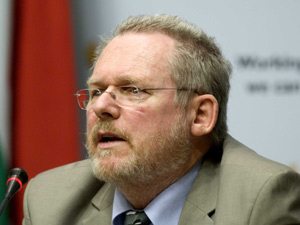
[miningmx.com] – SOUTH Africa’s government will soon apply stringent regulations to restrict the “unencumbered export of scrap metals’, according to trade and industry minister Rob Davies.
Launching the latest version of the government’s Industrial Policy Action Plan (IPAP) for 2013 to 2016, Davies also said the focus of the plan had fallen on beneficiation where the intention was ameliorate South Africa’s “existing and unsustainable dependence’ on the export of unprocessed commodities.
The IPAP, now in its fifth iteration, is aimed at creating economic growth by industrialising the economy. While the intention is to stimulate economic activity, the statements give yet further concern for ArcelorMittal SA, South Africa’s largest steel producer, as well as Anglo American’s Kumba Iron Ore, the largest miner of the steel manufacturing ingredient. Steel merchants may also fall foul of the policy assuming it is applied and the proper power is given to the regulatory authorities to enforce it.
To this end, it will fall to Paul Jordaan, who helped author the State Intervention in Mining (Sims) report, to oversee a major study aimed at beneficiating metals including iron ore, ferroalloys, steel, platinum group metals, titanium as well as producing polymers from coal, gas and oil.
The study will also assess strategies to realise upstream beneficiation manufacturing opportunities and look into the extraction and processing of these key minerals. The study is expected to be completed by the end of this year.
The trade and industry department has said before, however, that it does not plan to install an export levy on iron ore production. However, coal exports could be subject to a levy in an effort to redirect more supplies to Eskom.
Davies is particularly concerned about the very high input prices into the manufacturing sector. Said Davies: “Steel and plastics remain a major constraint to the competitiveness of domestic manufacturing and an impediment to foreign direct investment’.
Steps to counter this constraint include the now well-worn government intention to secure iron ore at developmental prices in order to offer downstream consumers below market prices for steel.
This means the Competition Act will need to be amended to curtail the abuse of market dominance in the supply of minerals for manufacturing.
“While South Africa is exceptionally rich in minerals, it has not been able to fully take advantage of the global boom in demand,’ Davies said.
“Currently, critical mineral feedstocks into the economy, such as steel from iron ore or polymers, are supplied into the South African economy at monopoly prices which seriously limit downstream job creation.’
The beneficiation strategy will necessitate proposals to deal with the current infrastructure constraints in terms of power and transport. All possible levers, including mining licences, producer power and incentives, will be assessed.










